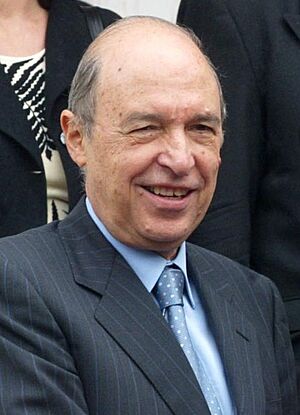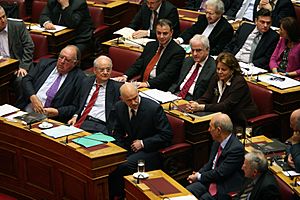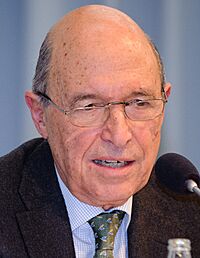Costas Simitis facts for kids
Quick facts for kids
Costas Simitis
|
|||||||||||||||||||||||||||||||||||||||||||||||||||||||
|---|---|---|---|---|---|---|---|---|---|---|---|---|---|---|---|---|---|---|---|---|---|---|---|---|---|---|---|---|---|---|---|---|---|---|---|---|---|---|---|---|---|---|---|---|---|---|---|---|---|---|---|---|---|---|---|
| Κώστας Σημίτης | |||||||||||||||||||||||||||||||||||||||||||||||||||||||

Simitis in 2003
|
|||||||||||||||||||||||||||||||||||||||||||||||||||||||
| Prime Minister of Greece | |||||||||||||||||||||||||||||||||||||||||||||||||||||||
| In office 22 January 1996 – 10 March 2004 |
|||||||||||||||||||||||||||||||||||||||||||||||||||||||
| President | Kostis Stephanopoulos | ||||||||||||||||||||||||||||||||||||||||||||||||||||||
| Preceded by | Andreas Papandreou | ||||||||||||||||||||||||||||||||||||||||||||||||||||||
| Succeeded by | Kostas Karamanlis | ||||||||||||||||||||||||||||||||||||||||||||||||||||||
| President of the Panhellenic Socialist Movement | |||||||||||||||||||||||||||||||||||||||||||||||||||||||
| In office 30 June 1996 – 8 February 2004 |
|||||||||||||||||||||||||||||||||||||||||||||||||||||||
| Preceded by | Andreas Papandreou | ||||||||||||||||||||||||||||||||||||||||||||||||||||||
| Succeeded by | George Papandreou | ||||||||||||||||||||||||||||||||||||||||||||||||||||||
|
|||||||||||||||||||||||||||||||||||||||||||||||||||||||
| Member of the Hellenic Parliament | |||||||||||||||||||||||||||||||||||||||||||||||||||||||
| In office 2 June 1985 – 7 September 2009 |
|||||||||||||||||||||||||||||||||||||||||||||||||||||||
| Constituency | Piraeus A | ||||||||||||||||||||||||||||||||||||||||||||||||||||||
| Personal details | |||||||||||||||||||||||||||||||||||||||||||||||||||||||
| Born | 23 June 1936 Piraeus, Greece |
||||||||||||||||||||||||||||||||||||||||||||||||||||||
| Died | 5 January 2025 (aged 88) Corinth, Greece |
||||||||||||||||||||||||||||||||||||||||||||||||||||||
| Resting place | First Cemetery of Athens | ||||||||||||||||||||||||||||||||||||||||||||||||||||||
| Political party | Panhellenic Socialist Movement | ||||||||||||||||||||||||||||||||||||||||||||||||||||||
| Other political affiliations |
PASOK – Movement for Change | ||||||||||||||||||||||||||||||||||||||||||||||||||||||
| Spouse |
Daphne Arkadiou
(m. 1964) |
||||||||||||||||||||||||||||||||||||||||||||||||||||||
| Relations | Spiros Simitis (brother) | ||||||||||||||||||||||||||||||||||||||||||||||||||||||
| Children | Fiona Marilena |
||||||||||||||||||||||||||||||||||||||||||||||||||||||
| Alma mater | University of Marburg London School of Economics |
||||||||||||||||||||||||||||||||||||||||||||||||||||||
Konstantinos G. Simitis (Greek: Κωνσταντίνος Γ. Σημίτης; born June 23, 1936 – died January 5, 2025) was a Greek politician. He was known for leading a "Modernization" movement in Greece. He became the leader of the Panhellenic Socialist Movement (PASOK) after Andreas Papandreou. Simitis served as the Prime Minister of Greece from 1996 to 2004.
Simitis was one of the first members of PASOK. He gained a lot of experience as a minister in Papandreou's governments. He became Minister of National Economy in 1985. At that time, he worked to make Greece's economy more stable. He resigned later when his policies were not fully supported.
In 1996, Simitis became the leader of PASOK. This happened after Papandreou's health declined. Simitis was not as charismatic as Papandreou. However, by the end of his time as Prime Minister in 2004, he had many important achievements. The Greek economy improved greatly. It became one of the fastest-growing economies in Europe. Greece also joined the Euro currency during his leadership.
Simitis also helped Cyprus join the EU. This was a very important goal for Greece. The successful 2004 Summer Olympics in Athens also showed Greece as a modern country. Many large building projects were finished, like the new Eleftherios Venizelos airport, the Athens Ring Road, Athens Metro, and Rio–Antirrio Bridge. New public organizations were also created.
After the debt crisis started in 2009, some people looked at Simitis's time in office differently. However, government organizations became stronger and more modern under his leadership.
Contents
About Costas Simitis
Costas Simitis was born in Piraeus, Greece. His father, Georgios Simitis, was a university professor. He studied law in Germany at the University of Marburg. He also studied economics at the London School of Economics. He was married to Daphne Arkadiou and they had two daughters, Fiona and Marilena. His brother, Spiros Simitis, was a well-known expert in data privacy in Germany.
Early Political Steps
In 1965, Simitis returned to Greece. He helped start a political research group. After a military coup in 1967, this group became Democratic Defense. This organization was against the military government. Simitis left Greece to avoid being arrested. He joined the Panhellenic Liberation Movement (PAK). He also taught at a university in Germany.
He came back to Athens in 1974. He helped create the Panhellenic Socialist Movement (PASOK). In 1977, he started teaching at Panteion University.
Serving as a Minister
Simitis did not run for Parliament in the 1981 elections. However, he was appointed Minister of Agriculture. This was in the first PASOK government. After the 1985 elections, he became a Member of Parliament. He then became Minister of National Economy. He tried to control rising prices and reduce government debt. He resigned in 1987 because he felt his plans were not fully supported.
In 1993, he became the Minister of Commerce and Industry. He resigned again in 1995. This happened after he received a public criticism from Prime Minister Andreas Papandreou.
Becoming Prime Minister
On January 16, 1996, Prime Minister Papandreou resigned due to poor health. On January 18, Simitis was chosen by his party to take his place. Papandreou remained the party leader until his death in June. After Papandreou's death, Simitis was elected as the new Party President on June 30. He won against Akis Tsochatzopoulos. Simitis supported Greece's role in the European Union.
Simitis then led PASOK to win the national elections in September 1996. This gave him his own clear mandate to govern. He also won the national election in 2000 by a small margin. He worked closely with his Cabinet Secretary, Sokratis Kosmidis. Simitis was respected in Europe. In Greece, some people saw him as a serious leader who lacked the charm of Papandreou.
On January 7, 2004, Simitis announced he would step down as party president. He also said he would not run for Prime Minister again. He had been in office for over eight years, which was a very long time for a Greek Prime Minister. On January 8, he called for new party leader elections. George Papandreou became the new PASOK leader. However, PASOK lost the March 2004 elections. Kostas Karamanlis from the New Democracy party became the new Prime Minister.
After His Time as Prime Minister
After 2004, Simitis remained a Member of the Hellenic Parliament. He represented Piraeus. He was re-elected in September 2007. He had some disagreements with George Papandreou, the new PASOK leader. In June 2008, he was no longer part of the PASOK parliamentary group. This was because he disagreed with Papandreou about a vote on the Treaty of Lisbon. Simitis had helped write this treaty.
He officially left his Member of Parliament seat for Piraeus before the 2009 elections. Before leaving, he warned about financial problems that could lead to a difficult economic period for Greece.
His Passing
Costas Simitis was found unconscious at his holiday home in Corinth, Greece, on January 5, 2025. He was taken to a hospital, where he passed away hours later at the age of 88. The Greek government announced four days of official mourning. He received a state funeral at the Metropolitan Cathedral of Athens on January 9. He was then buried at the First Cemetery of Athens.
What Costas Simitis Achieved
Social Changes
Many social improvements happened under Simitis. A special pension payment called EKAS was introduced. This helped people with lower incomes. Pension rates were also set to be 70% of the last five years of salaries. Pensions for farmers were also created.
New laws were passed about how public workers could negotiate their work conditions. This was the first time they had this right. Other laws dealt with working hours, overtime, and leave. A new system was also put in place to ensure more women were included in public sector leadership roles. In 2003, many laws were passed about jobs, safety at work, and social security.
Economic Improvements
Simitis is well-known for his idea of "Modernization" (Eksynchronismos). This idea focused on big government investments and building projects. It also included changes to the economy and labor laws. His supporters say he fixed many long-standing problems in the Greek economy. This helped Greece join the Eurozone.
During his time, official numbers showed that rising prices (inflation) went down from 15% to 3%. Government debt also decreased. The country's total economic output (GDP) grew by an average of 4% each year. People's actual incomes also increased.
Many large building projects were completed or started during this "Modernization" period. These included the new "Eleftherios Venizelos" Athens International Airport, the Rio-Antirio bridge, the Athens Metro, and the A2 motorway (Egnatia Odos).
Important Decisions

In 2000, Simitis had a disagreement with the leader of the Greek Orthodox Church, Christodoulos. The government wanted to remove the "Religion" section from national ID cards. This was based on a recommendation from the data protection authority. The Archbishop disagreed strongly. He organized large protests. Simitis's government stood firm on its decision. The Greek courts later ruled that including religious beliefs on ID cards was against the constitution.
Foreign Relations

Some people in his party did not like that Simitis moved away from older political ideas. They also did not like his more moderate approach to issues like the Cyprus dispute and the Macedonia naming dispute. However, his supporters saw these as positive steps for the "Modernization" movement he led.
From January to June 2003, Simitis was the Greek Prime Minister. During this time, he also led the presidency of the European Council.
Challenges and Criticisms
During Simitis's time in office, there were some concerns about corruption in public life. One notable case involved the Siemens company. Simitis was investigated regarding the Siemens Greek bribery scandal, but he was later cleared.
There were also questions about the accuracy of some economic data presented by his government. However, later rules from Eurostat (the EU's statistics office) changed how defense spending was counted. This showed that other countries also had similar situations with their budget numbers during that time.
Other criticisms included the 1999 Greek stock market crash and how some foreign relations issues were handled. The opposition leader, Kostas Karamanlis, once accused Simitis of promoting favoritism. However, Karamanlis later said he had exaggerated and never doubted Simitis's personal honesty.
Images for kids
See also
 In Spanish: Costas Simitis para niños
In Spanish: Costas Simitis para niños
 | Valerie Thomas |
 | Frederick McKinley Jones |
 | George Edward Alcorn Jr. |
 | Thomas Mensah |





